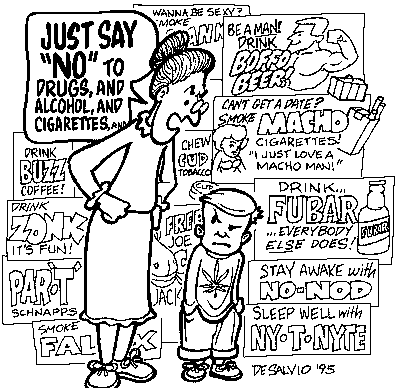
America's "Just Say No" Addiction
by Jeff Elliott
Tell Me What I Want To Hear
The Politics of D.A.R.E.
State Drug Education Gets "F" Study Says


Tell Me What I Want To Hear |
Although most programs are ineffective (and sometimes even harmful), America continues to spend about $2 billion per year on drug education. Why? Because it makes us feel like we're doing something about the problem
|
|---|---|
The Politics of D.A.R.E. |
A close look at America's favorite drug program: how it's taught, how it started, and how it fights off its many critics
|
State Drug Education Gets "F" Study Says |
Students don't believe the "just say no" message and most of the $1.6 billion spent over the past four years has been wasted, but the California Department of Education won't circulate the report
|
"I can't get caught in the middle here -- I've got my job," the man whispered into the phone, careful not to be overheard by his coworkers. "But I've seen data that this stuff doesn't make any difference at all."
With these words back in 1991, I was ushered into the murky world of drug education. At the time, I was fishing for leads on what I thought would be a minor story. Surely, I assumed, the whole "Just Say No" chant had died away years before, and the folks still preaching the message were a dwindling breed of die-hards.
I was wrong. The just-say-no dogma is entrenched in our schools and the movement still thrives, probably far beyond Nancy Reagan's wildest dreams. Today it is a $2 billion/year industry -- and that's a conservative estimate.
As I dug into the story, I found many -- if not most -- of the people who develop and teach these programs knew they didn't work, just like my secretive friend who whispered those magic words. But at the same time, everyone was afraid to say that the emperor has no clothes. It's easy to see why: more than a few careers have been ruined or damaged after speaking out.
The blame lies with the federal government, most particularly the Department of Justice. Most of the drug ed money flows from Washington, where the Department has established our national policy in this, and all other aspects of the War on Drugs. That this Department is dictating the curriculum in the nation's classrooms is absurd; imagine the uproar if the Department of Defense, say, had complete control over what a teacher could present about the Vietnam War.
Over the last ten years and through three presidencies, the Just Say No juggernaut has only grown stronger with each passing year, despite a growing body of literature that proves the programs just don't work. But whether children are helped or not doesn't seem to matter; after all, there's lot of money to be made. And the programs make everyone feel so gosh-darn good that they're doing something to help the kids.
All Rights Reserved.
Contact rights@monitor.net for permission to reproduce.